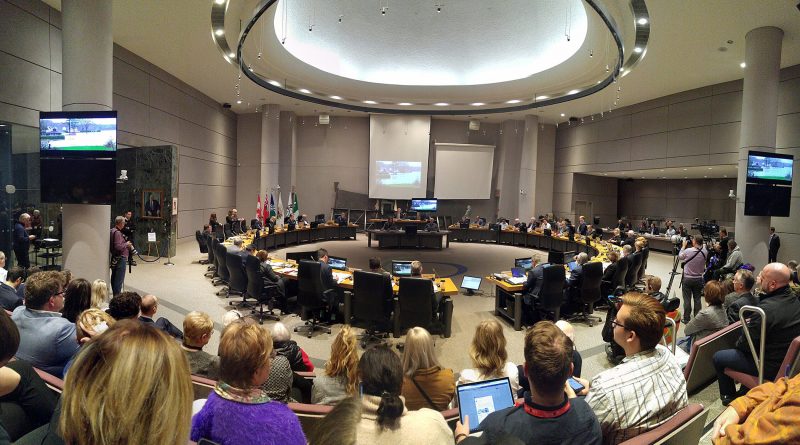Council approves 2022 budget after marathon, testy meeting
CITY HALL – A testy Ottawa council took hours, made changes, but eventually approved the 2022 City of Ottawa budget in a 16 to eight vote during yesterday’s (Dec. 8) city council meeting.
Both transit and police spending plans were debated lengthily and hotly by city councillors with Coun. Jan Harder telling Coun. Ryley Brockington to “shut up” at one point during the discussion.
During a long discussion on the police budget which included input from Ottawa Police Service (OPS) Chief Peter Sloly, council did not approve the police’s budget request, trimming the ask by two per cent.
The OPS had asked for a $14 million budget increase. But the police services board, facing pressure from community groups and some councillors who wanted to see no increase to the police budget, opted to reduce the service’s ask and instead manoeuvred some of the money that could have gone to the police towards other community initiatives intended to reduce the number of calls the police respond to.
It was a split council that voted to approve the police budget. Of the five councillors who voted against the budget, Rick Chiarelli and Jan Harder had indicated they supported giving more money to the police. Jeff Leiper, Catherine McKenney and Shawn Menard commented before the vote that they would have liked to have seen more money diverted away from the police and into the community.
Sloly told councillors that the budget council ultimately approved presented the service with a number of challenges, including that the force could run a budget deficit in 2022, which the city would ultimately have to pay.
Sloly also said constraints on the OPS budget could lead to reductions in front-line policing services, particularly if a co-response model — which could take over some of the police calls other agencies are better suited to respond to, like some mental health calls — was not in place and ready to operate in 2022.
Coun. Diane Deans, who chairs the Ottawa Police Services Board, presented a motion, which was unanimously approved by council, to divert $550,000 of the $2.65 million that would have gone to the police to the city’s Community and Social Services Department to develop an alternative call referral program. Such a program would, in theory, eventually lead to some lower priority calls being diverted away from police and would help the service respond to fewer mental health and addiction-related calls.
“Police often do not have the training needed to respond to these calls,” Deans said, “and in responding to these calls police services are being used to address social issues that could be better responded to by someone else.”
As council debated the issued, Coun. Harder was overheard on the livestream of the meeting, telling Coun. Brockington to shut up as he was addressing council. The mayor and chair of the meeting said they did not hear the comment, and Harder gave a somewhat half-apology, claiming she didn’t recall saying that.
“If I said that, it was a reaction, but I don’t recall saying that,” she said. “If that’s what you heard, that’s unfortunate, and I withdraw what I didn’t hear me say.”
In the end the OPS will receive a $11.35 million increase in 2022 after a 19 to five council vote in favour.
Just before 9 p.m., council finally approved the coming year’s city budget.
“Council approved the city’s 2022 budget today (Dec. 8), ensuring the city can continue to deliver essential services while still advancing council priorities, including affordable housing, support for social services, affordability for small businesses and the health and safety of residents,” city staff released in a statement yesterday (Dec. 8) evening. “The budget will help keep Ottawa affordable by capping the overall municipal tax increase at three per cent, valued at an estimated $56.1 million. This means the average urban homeowner will pay an additional $119 per year while the average rural homeowner will pay an additional $91 per year.”
The budget includes $427.3 million in capital funding to improve roads, bridges, culverts, sidewalks, pathways and intersections. It provides $194 million for the integrated program, which includes $76 million for road resurfacing. The program also includes $118 million for integrated projects that reduce costs by coordinating underground infrastructure work with reconstruction of roads, sidewalks, and pathways. Another $62 million will fund major road construction projects while $13.4 million will enhance active transportation through programs like the Cycling and Pedestrian Facilities Programs.
The city will invest $17 million to develop more affordable and supportive housing, which includes $15 million in capital and $2 million in development charge exemptions for residents in greatest need. That investment builds on commitments in the previous three budgets totalling $51 million in this Term of Council. An additional $1 million in city funding will help local landlords make essential repairs and further increase the supply of affordable rental units in Ottawa.
The city has earmarked $27 million in Community Funding to non-profit social services agencies. With this largest increase to the Community Funding Framework since 2006, the funding demonstrates the city’s commitment to sustaining a strong social services sector to support communities that are most marginalized in Ottawa. The cost of the EquiPass for low-income residents and the Community Pass for Ontario Disability Support Program recipients will also remain frozen at 2018 rates.
Council allocated $2.1 million from the OPS budget to support racialized youth program solutions, community-based, culturally appropriate mental health prevention services, addictions and crisis outreach services, and culturally safe mental health programs, services, crisis and social supports for our Indigenous community. It also directed up to $550,000 to develop an alternative call referral program identifying how and to whom low-risk, low-acuity 911 calls should be redirected.
Council allocated $435,000 from the OPS budget to fund a mental health strategy for the ByWard Market and Lowertown areas. The initiative is a partnership between local stakeholders, service providers and city representatives.
A proposed 2.5 per cent general fare increase for OC Transpo will only come into effect one full month after 15 trains are made available by Rideau Transit Group (RTG) for revenue service on O-Train Line 1. Once available, the number of trains in use to meet customer demand will be at the discretion of the General Manager of Transit Services. OC Transpo is also providing up to 2,000 no-charge transit passes to emergency shelters for the use of shelter clients.
The budget commits to greater affordability for local small businesses as well. The city has implemented a 15-per-cent tax discount for small businesses on qualifying properties. The full discount will be phased in over two years starting with a 7.5-per-cent reduction in 2022, benefiting about 10,000 small businesses.
Council briefs
Council received three new audits, examining the city’s grants and contributions program, benefits processing for long-term disability and the competitive procurement process. In all cases, the city agreed with recommendations from the office of the auditor general. Council also approved the auditor general’s 2022-2023 workplan.
Council approved a zoning amendment on the creation and placement of outdoor commercial patios and retail pop-up spaces on private property. The amendment eliminates the minimum separation required between a patio and a residential zone, offering more flexibility for potential patio operators. While the city introduced these measures on a temporary basis in 2020, the amendment approved today will make those changes permanent.
Council also approved a new secondary plan to clarify the types of development permitted on or adjacent to Bank Street, between the Rideau Canal and Highway 417. The Bank Street in the Glebe Secondary Plan would make future growth in the area more predictable and ensure intensification happens in ways that protect the Glebe’s heritage character and build on the community’s pedestrian-oriented nature.














Pingback:El-Chantiry says 2022 budget great for Ward 5 – West Carleton Online